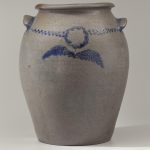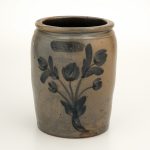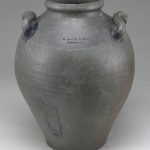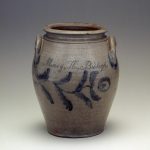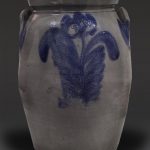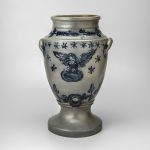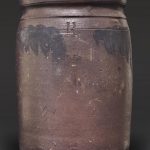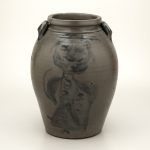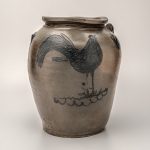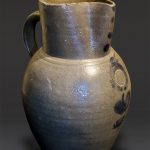The Richard Randolph Manufactory
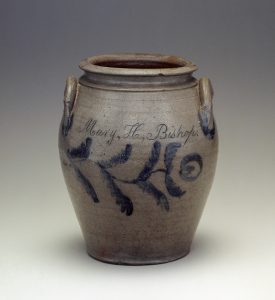
Storage Jar Inscribed “Mary H. Bishop”
Attributed to Samuel Frayser (1787-1849)
at the former Richard Randolph Manufactory
or the Frayser Pottery (after 1824)
Four Mile Creek, Henrico County, Virginia
1821-1849
Salt-Glazed Stoneware
Private Collection
As a member of the most prominent local planter family, Richard Randolph of Tuckahoe was an unlikely pottery owner. His interests in manufacturing and trade were progressive for their time. In 1806, Richard and a partner purchased a mill on Four Mile Creek on the north side of the James River. The mill had clearly seen better days. Discouraged by the high cost to repair the mill, Randolph salvaged his investment by converting “Norwich Mills” into a stoneware factory. He ran advertisements in the Richmond newspaper and hired skilled potters. Randolph later christened the 400-acre mill tract “Kaolin” after the fine white grade of clay he found there.
Richard Randolph’s first potter appears to have been Henrico County native Samuel Frayser. Very little is known of Frayser’s life and work, although documents prove he was originally employed by Randolph as a potter. From about 1824 to his death in 1849, Frayser operated independently.
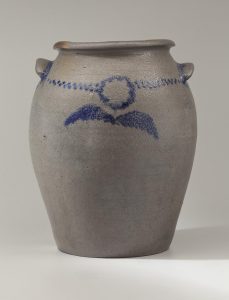
Storage Jar
Thomas Amos (1786-1822)
for the Richard Randolph Manufactory
Four Mile Creek, Henrico County, Virginia
1821-1822
Salt-Glazed Stoneware
HOA: 12 1/2”, WOA: 10 1/2”
Loan courtesy of Colonial Williamsburg
Another Randolph Potter was Thomas Amos. Amos was a member of a prominent Baltimore Quaker potting family. Thomas closed a Baltimore partnership, leaving his brother William to continue there, when he moved with his wife and son to Four Mile Creek near Richmond. Thomas found lodging and work with Samuel Frayser at the former Randolph factory. Amoss worked alongside Frayser from 1818 to 1821, when the two began to work independently. Thomas died in 1823, leaving the disposal of his land and operation to his wife’s discretion.

